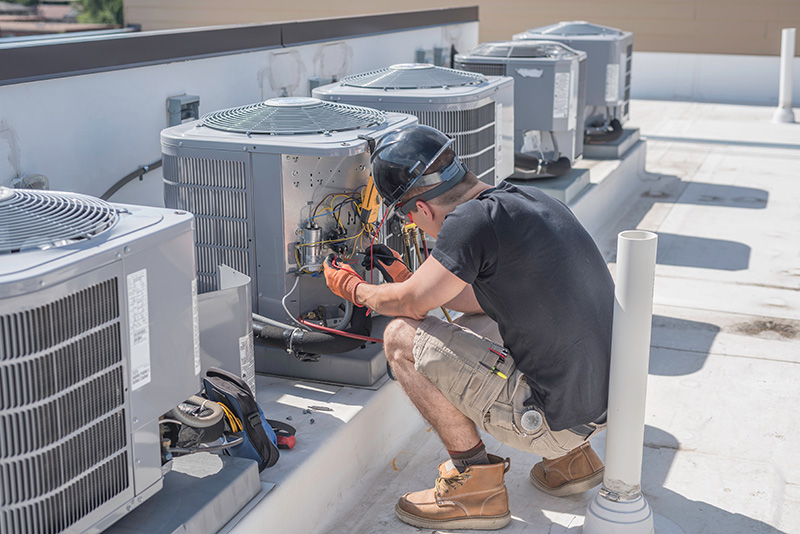Choose DMAKS HVAC for Reliable and Professional HVAC Solutions.
Choose DMAKS HVAC for Reliable and Professional HVAC Solutions.
Blog Article
Energy-Efficient A/c Solutions to Minimize Utility Bills
As power costs remain to climb, the value of energy-efficient a/c systems becomes progressively apparent. These systems not only promise substantial financial savings on energy bills but additionally add to a more sustainable future by minimizing power intake. With numerous alternatives readily available, consisting of geothermal heatpump and ductless mini-splits, residential or commercial property proprietors encounter a wide variety of options that can enhance comfort and air high quality. Comprehending the key attributes and upkeep requirements is important to making best use of these benefits. What aspects should be prioritized when picking the best system for your needs?
Advantages of Energy-Efficient A/c Solutions
Energy-efficient HVAC systems supply many benefits that expand past simple expense savings. By taking in much less energy, these systems contribute to decrease greenhouse gas emissions, aiding to deal with environment adjustment and advertise sustainability.
In addition, energy-efficient cooling and heating systems usually offer improved comfort levels. A lot of these systems include advanced modern technology that enables much better temperature control and boosted air quality (DMAKS HVAC). This results in a healthier interior atmosphere, which is especially crucial for people with allergies or respiratory issues
Moreover, spending in energy-efficient cooling and heating systems can enhance home value. As even more consumers prioritize power effectiveness, homes and buildings furnished with these systems may draw in higher bids in the property market.
Types of Energy-Efficient Heating And Cooling Options
How can homeowners and companies select the most ideal energy-efficient heating and cooling alternatives for their requirements? The marketplace offers a range of energy-efficient heating and cooling systems, each developed to enhance convenience while minimizing power consumption.
One alternative is the variable refrigerant circulation (VRF) system, which effectively regulates the temperature in multiple areas within a building. This system adjusts its cooling agent flow to match the wanted temperature, causing significant power financial savings.
One more prominent selection is geothermal heat pumps, which make use of the earth's steady temperature level to heat and cool areas. By moving warmth to and from the ground, these systems show remarkable performance, particularly in modest climates.
Furthermore, ductless mini-split systems supply an energy-efficient option for homes doing not have ductwork. These systems permit zone-specific heating & cooling, decreasing energy waste in vacant locations.
Last but not least, high-efficiency heating systems and ac system, with sophisticated SEER and AFUE rankings, provide trusted environment control while taking in less energy than conventional models. By assessing these choices, house owners and organizations can pick an a/c system customized to their specific demands and power efficiency objectives.
Trick Functions to Consider

Next, check out the sort of compressor used in the system. DMAKS HVAC. Variable-speed compressors can change their result to match the home heating or cooling down need, causing boosted comfort and power financial savings compared to single-speed designs. Furthermore, search for systems equipped with smart thermostats that use programmable setups and site here remote gain access to, permitting for far better control over power usage
One more essential function article is the system's air filtering capacity. High-efficiency filters can enhance indoor air high quality and reduce energy intake by making certain the system runs successfully. Think about the kind of refrigerant used; contemporary systems typically employ environment-friendly refrigerants that have a lower ecological effect.
Lastly, guarantee that the system is compatible with zoning modern technology, which permits personalized temperature level control in various areas of your home, boosting convenience while reducing energy use.
Tips for Selecting the Right System


Next, think about energy effectiveness scores, especially the Seasonal Power Effectiveness Proportion (SEER) for cooling down systems and the Yearly Fuel Utilization Effectiveness (AFUE) for heater. Higher ratings suggest higher efficiency, which can bring about significant savings on energy expenses with time.
Furthermore, assess the sort of a/c system that finest fits your way of living and budget plan. Options consist pop over to this site of central air, ductless mini-splits, and heat pumps, each with its very own set of benefits and disadvantages.
Do not overlook the value of appropriate installation and sizing; an inaccurately sized system can bring about inadequacies and raised wear. Last but not least, seek advice from with a specialist cooling and heating contractor to get professional referrals customized to your home's distinct requirements. This thorough method will make certain that you choose an energy-efficient cooling and heating system that satisfies your needs and spending plan properly.
Maintenance for Optimal Performance
Once the ideal a/c system remains in place, recurring maintenance comes to be vital to making sure ideal performance and durability. A well-kept system runs better, leading to lower energy intake and reduced energy costs. Regular assessments and tune-ups must be set up at the very least two times a year-- when before the air conditioning season and as soon as prior to the heating period.

Homeowners ought to likewise be attentive regarding monitoring their cooling and heating system's efficiency. Unusual sounds, fluctuating temperature levels, or raised energy expenses can suggest underlying issues that need prompt attention. By resolving these problems quickly, home owners can avoid expensive repair work and extend the lifespan of their systems.
Spending in an upkeep plan with a certified technician not only enhances performance yet likewise provides satisfaction, recognizing that the system is running at its best. DMAKS HVAC. Normal upkeep is as a result vital for sustaining energy effectiveness and decreasing overall operational costs
Conclusion
Finally, energy-efficient cooling and heating systems provide a feasible option for reducing utility expenses while improving comfort and air top quality. By integrating sophisticated modern technologies and choices such as geothermal warm pumps and ductless mini-splits, residential property proprietors can accomplish considerable power cost savings and add to ecological sustainability. Careful factor to consider of system functions and recurring maintenance better ensures optimal performance, making energy-efficient systems a sensible investment for both economic and environmental benefits.
Report this page